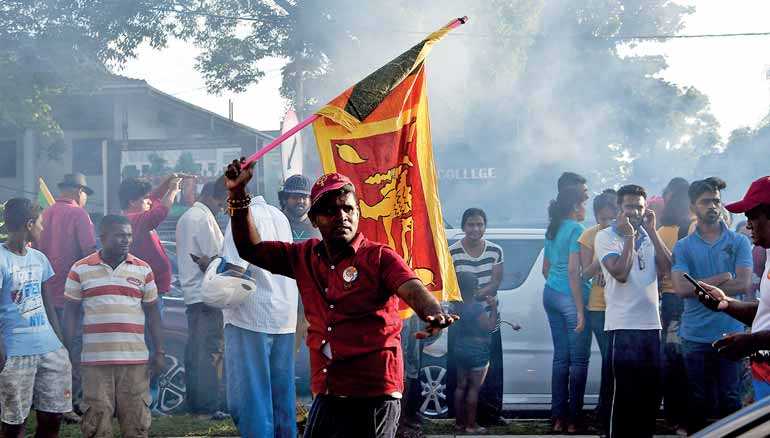Sunday Feb 22, 2026
Sunday Feb 22, 2026
Friday, 11 September 2020 00:20 - - {{hitsCtrl.values.hits}}

In terms of democracy, Sri Lanka was in the dark even with the enforcement of the 19th Amendment. The 20th Amendment may plunge the country into pitch darkness, democratically. But, those who cannot discern the darkness that prevailed prior to the 20th Amendment shall not comprehend the post-20 pitch darkness that is in store – Pic by Shehan Gunasekara
Governance-wise, the 20th Amendment can be described as a regressive step. In my opinion, with the enactment of the 20th Amendment, one era of Sri Lanka will come to an end. 
The era that ends with the introduction of the 20th Amendment cannot be considered as an era of democracy. Similarly, the new era that begins with the 20th Amendment too, cannot expect to be an era in which the system of democracy will thrive in its true spirit except that it would herald a period in which a system of dictatorship will have more weight.
There cannot be a qualitative difference except a quantitative difference between the period ending with the 19th Amendment and the one that begins with the 20th Amendment. Since independence, Sri Lanka has generally been regarded as a country which has held elections continuously. That is why many consider Sri Lanka to be a democratic country.
Although the rulers who have come to power from time to time have been elected by popular vote, it cannot be said that much of the country’s affairs since independence have been carried out in a democratic milieu.
Puzzles of Sri Lankan democracy
In a democratic sense, Sri Lanka, at the time it gained independence, was not in a developed stage capable of maintaining a system of self-governance of its own. Even after independence, the situation did not improve much. So much so, in the democratic sense, compared to the Indian Independence Movement, the Independence Movement of Ceylon steered by the National Congress was lagging in an extremely backward position.
There were many leaders who had a theoretical understanding of liberalism among the leaders of the Indian Independence Movement, and it can be said that there was hardly a single person among the leaders of the National Congress of Sri Lanka who understood liberal principles.
The Ceylon National Congress was not a strong advocate of democratic rights, nor did it play a vital role in the socialization of democratic values. In a democratic sense, it remained at such a backward stage that it strongly opposed even the granting of universal franchise to Sri Lanka.
Gaining independence
Despite Sri Lankan society remaining poor in terms of democratic values on the eve of independence, the British, however, conferred a fully-fledged Westminster-style parliamentary system of governance to Sri Lanka when they left it granting independence.
But neither the national leaders nor the Sri Lankan society had the democratic knowledge or discipline required to maintain and carry forward the newly gained system of governance in a strong and creative manner.
The Burghers were the only indigenous community in Sri Lanka which could be considered to have had a deep understanding of liberal ideology at the time the country gained independence. It was through them that liberal ideas could have spread among other communities viz. the Sinhalese, Tamils and Muslims.
Yet, the other natives of Sri Lanka did not have a favourable attitude towards the Burger community and they were looked down upon as an inferior and mixed ethnic-stock and were contemptuously referred to as thuppahi lansi or cockroach lansi. Under the circumstances, a strong feeling had grown among the Ceylonese burghers that they will have no future in independent Sri Lanka.
At that time, it was mostly the Burghers who constituted the backbone of the public service, especially the Judiciary of Sri Lanka. After independence there was a marked decline in the public service particularly in the judiciary due to a large number of not only the Europeans but also the Burghers leaving Sri Lanka. The departure of the Burghers who could be considered an ethnic group enriched with liberal attitudes has been an important factor in weakening democracy in Sri Lanka.
Defending the Constitution
Traditionally, any country with a democratic vision and discipline has a great faith in and respect for the country’s constitution. Violating the Constitution is considered to be the most serious offense by such a country. And it is very rare that one can hear of the instances of violation of the Constitution in a democratic country. The American Constitution is as old as 231 years. It has been violated by only one President of the USA during this long course of history.
The term of office of an American president is four years. The American Constitution does not specify the number of terms a president could hold the office. Yet, all presidents, from President George Washington, the first president to Roosevelt, have served only two terms. Although it was not a constitutional provision, it was considered a tradition to be followed by all presidents.
But Roosevelt, who became President of the USA during World War II, served four terms, contrary to the tradition maintained up to then. In this backdrop, the 22nd Amendment to the Constitution was introduced in 1952, limiting the number of terms of the office of a President to two, so as not to allow another President to commit that offense.
In India, too, during Indira Gandhi’s last regime, there were serious constitutional violations by her government which commanded a large majority in the Parliament. The 42nd Amendment, which she proposed violating the Constitution, was strongly opposed by the judiciary. Yet, she was able to circumvent the judiciary and pass the amendment taking advantage of the majority power she commanded in the parliament
However, with the change of the regime of Indira Gandhi, the 43rd and 44th Amendments were enacted in 1978 repealing the 42nd Amendment, which had caused a distortion in the Constitution; and the Supreme Court barred the introduction of amendments that would have changed the basic structure of the Constitution to prevent further distortions of similar nature.
Violation of the Constitution
Sri Lanka can be ranked as one of the world’s most prominent countries for violating the Constitution. Violation of the Constitution has been a regular occurrence at the hands of State rulers since independence. So much so, that violation of or sacrilege in relation to the Constitution is not considered a serious offence in Sri Lanka.
Even before the ink on the Soulbury Constitution had run dry, D.S. Senanayake, the first Prime Minister of Sri Lanka, then Ceylon, violated the Constitution by enacting citizenship ordinances which led to deprive the citizenship rights of those who were entitled to them.
Again in 1956, Prime Minister S.W.R.D. Bandaranaike violated the Constitution by enacting the discriminatory piece of the ‘Official Languages Act,’ depriving Tamil people of their right to have ‘reasonable use’ of Tamil language.
The first Republican Constitution enacted in 1972 by the coalition government of SLFP, LSSP and CP that came to power in 1970, was adopted in a manner that violated the accepted constitutional norms and traditions. Thereafter, the Second Republican Constitution introduced in 1978, was also drafted violating accepted traditions of constitution making.
During the 17 years rule of the UNP since 1978, the number of instances in which the Constitution was violated intentionally have been numerous. The extension of the term of office of the Parliament where the UNP had a five-sixth majority in Parliament, by a corrupt referendum, is considered to be the most infamous violation of the Constitution during that period.
President Chandrika Kumaratunga who came to power subsequently, even without having a two-thirds majority in the Parliament wanted to change the Constitution, adopted a policy of violating the Constitution with the connivance of the Judiciary. Presidents Mahinda Rajapaksa and Maithripala Sirisena who came to power after Chandrika can also be considered as Presidents who have violated the Constitution.
The Judiciary, which is responsible for upholding the Constitution, adopting a policy of violating the Constitution by joining hands with many rulers, has become an inherent feature of the constitutional violations in Sri Lanka.
Democracy overturned
It was after the establishment of a presidential system of governance in 1978 that the democratic character of the people’s representatives was completely overturned. Along with that, the Parliament lost its supremacy and became a mere rubber stamp of the President.
Under the circumstances, probably to keep the parliamentarians happy, a system of granting privileges, special rights and immunities, which were contrary to law and accepted democratic traditions, and conducive to corrupt the character of people’s representatives, was created. This eventually led to making the MPs businessmen transacting dubious businesses with the government, illegally.
Furthermore, the laws that restricted spending on elections by candidates contesting elections, the system of auditing of funds received and expended by political parties were abolished creating an atmosphere for candidates to gang up with the dealers of black money.
This situation led to change not only the nature and the character of the Parliament but also that of the State itself. The contest for State power became a fierce struggle for the right to plunder public property, in addition to the right to rule the country. Thus, the looting of public property which is under temporary custody of the rulers became a regular feature of the State rule in Sri Lanka. The changes that had taken place in this way did not come under protest but the acceptance of the MPs. Since then, all reforms added to the political system (including the 19th Amendment) can be considered as ostentatious fabrications intended to conceal the true nature of plunder being carried out in the name of public administration, and to give the system a quasi-democratic appearance.
The Election Commission of Sri Lanka alone can be cited as an example to illustrate the ugly situation that prevails in Sri Lanka. However, this unpleasant scenario can be changed by emulating at least the system of Election Commissions in other democratic countries. There are about 12 countries, including India and the United Kingdom in which the System of Election Commissions is being operated.
In almost every country indicated above except Sri Lanka, Election Commissions have been set up with comprehensive powers to monitor the spending of funds of political parties by candidates on elections, to determine whether the internal affairs of political parties are conducted in accordance with the respective constitutions of political parties, and to investigate into incidents where MPs doing business with the government in violation of the law.
However, it is interesting to note that the Elections Commission of Sri Lanka has been set up in such a way that it does not have wide powers outlined above. It must be said that the real status of all other commissions is also not much different. Democracy that prevailed prior to the 20th Amendment was unable to do justice to Shani Abeysekera.
In every country where a democratic political system is in operation, Presidents and Parliamentarians elected from public vote are prohibited from transacting business with the government. But since 1978, elected Presidents as well as MPs in Sri Lanka have been involved in doing business with the government. This is not something done in secret, but in public.
Corruption in Sri Lanka has become an uncontrollable menace because people’s representatives who are at the helm of State rule have openly adopted a policy of plundering public resources in their custody and disposal. Regrettably, the reforms introduced to the system of governance since 1978 have not been conducive to change this uncivilised status, except to strengthen it further.
In terms of democracy, Sri Lanka was in the dark even with the enforcement of the 19th Amendment. The 20th Amendment may plunge the country into pitch darkness, democratically. But, those who cannot discern the darkness that prevailed prior to the 20th Amendment shall not comprehend the post-20 pitch darkness that is in store.